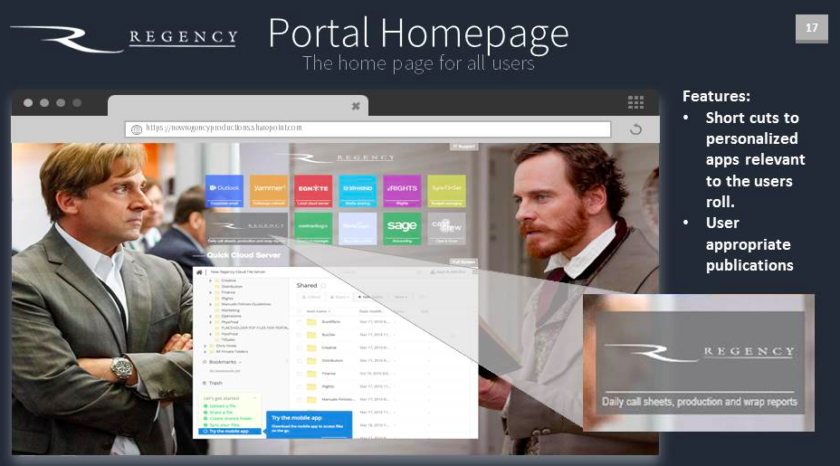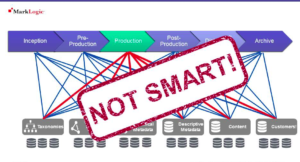HITS

MarkLogic, New Regency Highlight Importance of Data
Story Highlights
If you’re in the film business, you’re probably aware by now: All the data around your content is critically important, and it’s critically important at every stage, from inception to pre-production, from distribution to archival.
But while progress has been made among media and entertainment companies when it comes to the ingestion and use of metadata around content, making the data easily accessible to everyone all the way through every stage of the supply chain is still a work in progress, according to Matt Turner, CTO of media and entertainment for metadata specialists MarkLogic.
“We’re all still working on getting data to work right across all these different pieces,” he said during the Feb. 1 webinar “Lights, Camera, Actionable,” presented by the Media & Entertainment Services Alliance (MESA). “You need a vision for smart content, a way to look at the data used across the whole content process.”
Data collection and management has become a critically important tool for content companies, and progress has most assuredly been made, Turner added. But still: “Every single piece of the supply chain has their own systems, their own processes, even their own data models,” he said. “There’s a shared concept, but it’s tuned for one particular stage of the supply chain.”
The semantics and technical and descriptive metadata accounted for early on in the inception and pre-production of a project may not line up with the content and consumer data used during distribution, yet they can be equally important, Turner added.
“When we look at this smart content vision, we know [the data] is important, we know everybody needs access to it, but the data is in separate places, and what’s updated in one system won’t be reflected in a different system,” he said.
That’s the challenge MarkLogic has undertaken with its technology offerings, with the goal of making metadata more easily ingested, accessible, understood, and put into action by media and entertainment companies, allowing them “to focus on creating the content,” Turner said.
Lulu Zezza, physical production executive for New Regency Productions, is of like mind with Turner: the collection and usage of metadata is more important than ever for content creators.
She described a “very messy world of information” at New Regency in past years, with her given the task of organizing New Regency’s production data, and securing it.
“The biggest problem as far as securing is the information, in order for it to flow among all those who need it, all the collaborators, is for the most part that it’s shared via email,” she said. “It’s difficult to prevent that email from being forwarded. They’re sharing more than they should with people.”
And all the different storage solutions being used by different divisions is “scary,” she added. “How can we make it all more efficient to connect to information, and reduce the need for excess sharing?”
Zezza spent months analyzing all the potential problems involved in sharing data across the company’s divisions, interviewing executives and crew, and finding out how to balance access to information while securing it. “We needed to improve how we collect data, it’s accuracy, and allow for easy flow of information,” Zezza said.
She relayed a story about how the lack of easily accessible metadata around one project caused headaches for the company. “Within hours” of the Leonardo DiCaprio thriller “The Revenant” being released in theaters in 2015, New Regency began getting calls from individuals saying they had speaking roles in the film, but weren’t credited (which meant no residuals), Zezza said. And because so much make-up was involved with the actors, it was nearly impossible to determine who was who, she said.
 Establishing whether or not someone is due residuals is just one example of why data collection from day one is important. Same goes for product placement.
Establishing whether or not someone is due residuals is just one example of why data collection from day one is important. Same goes for product placement.
“It eliminates rekeying information and sending it over and over,” Zezza said. And the introduction of a new and unique software-driven production data hub at New Regency (developed with MarkLogic) — one that enables creatives to work easily on any project, with executives able to analyze data, and utilize it at any point — could be the solution.
“In the new system, the idea is while we’re watching dailies, the day after we film, every person, every product, all the dialogue, everything with those dailies, will be attached to them as metadata, and linked to each take of each set-up,” Zezza said. “If we’d had that [during ‘The Revenant’] and been able to attach that to [the actors] we could say ‘Joe went home early, he didn’t finish the day,’ or ‘Yes [director] Alejandro [González Iñárritu] pulled that extra forward and gave him a line.’ We’d have that information hot and ready.”
And if that New Regency-MarkLogic proof of concept yields dividends, it could prove to be a metadata collection model for the rest of Hollywood.
To access the webinar, click here.









